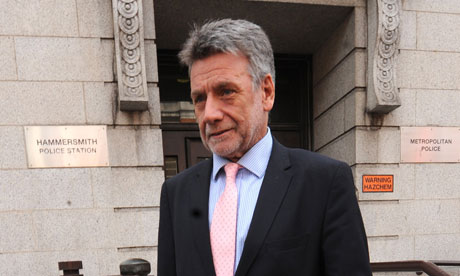In total, the retailer has asked for nearly £3m in compensation from police forces around the country, following the riots that tore through some high streets in August. It is likely that this is the biggest request from a single retailer. The company is claiming under the Riot Damages Act, a piece of Victorian legislation that allows businesses and individuals affected by riot damage to claim directly from the police, rather than their own insurer. In the immediate aftermath of the civil disturbances, the British Retail Consortium urged small retailers to put in their claims to make sure their businesses were not harmed. However, the Greater Manchester Police Authority, which has been hit with 280 claims totalling £4.4m, has criticised Tesco for using the Act, saying there was no guarantee the police force would be able to afford all of the compensation. The force faces £134m budget cuts in the next five years. It added that J Sainsbury was one of a number of large companies that had chosen not to submit any compensation claims. Tesco has submitted more than 20 claims for compensation to Manchester police, including one for £40-worth of looted stock.







 Alexa Chung's latest range for Madewell caused the retailer's website to crash. The British beauty announced her partnership with the label last year, creating a line that was popular amongst fashionistas. Alexa launched her second collection with the US brand yesterday and celebrated with a star-studded bash in Los Angeles. The 27-year-old star tweeted her excitement before the party. "It's my Madewell collection launch party tonight in LA. Very Exciting," she wrote, before later letting her fans know how popular the launch had been. "Congrats! You crashed the @madewell1937 website with the purchase onslaught. Glad you like it! Xxxx (sic)," she added. Guests at the fashion launch included Kate Bosworth, Elle Fanning, Amanda Seyfried and Dianna Agron. Alex donned a gorgeous Madewell mini dress for the party, while Elle also opted to wear the designer. The young actress chose a lacey shift, while Amanda wore a polka dot Madewell blouse. Diana also chose to sport the label, and opted for a tan-coloured shirt dress. Alexa's range includes vintage-inspired tea dresses, skirts and lace tops. The star's advertisements, which were shot in Austin, Texas, were recently revealed last month. "We were all so in sync," Madewell's Head of Design, Kin Ying Lee said of the process. "Since it's the second collection, it was like old friends getting together and creating something - and having a great time in the process.
Alexa Chung's latest range for Madewell caused the retailer's website to crash. The British beauty announced her partnership with the label last year, creating a line that was popular amongst fashionistas. Alexa launched her second collection with the US brand yesterday and celebrated with a star-studded bash in Los Angeles. The 27-year-old star tweeted her excitement before the party. "It's my Madewell collection launch party tonight in LA. Very Exciting," she wrote, before later letting her fans know how popular the launch had been. "Congrats! You crashed the @madewell1937 website with the purchase onslaught. Glad you like it! Xxxx (sic)," she added. Guests at the fashion launch included Kate Bosworth, Elle Fanning, Amanda Seyfried and Dianna Agron. Alex donned a gorgeous Madewell mini dress for the party, while Elle also opted to wear the designer. The young actress chose a lacey shift, while Amanda wore a polka dot Madewell blouse. Diana also chose to sport the label, and opted for a tan-coloured shirt dress. Alexa's range includes vintage-inspired tea dresses, skirts and lace tops. The star's advertisements, which were shot in Austin, Texas, were recently revealed last month. "We were all so in sync," Madewell's Head of Design, Kin Ying Lee said of the process. "Since it's the second collection, it was like old friends getting together and creating something - and having a great time in the process.

 When Spanish bullfighter Serafin Marin plunges his sword into the back of a bull's neck in Barcelona on Sunday, he will be marking the end of an era. The bull will not only be the last of six killed in the bullfight, but the last-ever to be killed in Barcelona's Monumental bullring, which is nearly a century old. The closure of the Monumental - in keeping with a bullfighting ban in the north-eastern region of Catalonia - reflects the decline of bullfighting in Spain, though fans of the country's 'national fiesta' vow to fight on. 'We have lost a battle, but not the war,' Marin told the daily El Mundo. But animal rights campaigner Aida Gascon said, 'Now that we have achieved (the end of bullfights) in Catalonia, we shall try to finish with them in the rest of Spain.' Catalonia, a wealthy region of 7.5 million people, has spearheaded the campaign against bullfights, or 'corridas,' in a country where animal rights activism is on the rise. The Catalan capital of Barcelona declared itself an 'anti-bullfight' city in 2004. Dozens of other municipalities followed suit, and finally in July 2010 the regional parliament outlawed bullfights from January 1, 2012. The Canary Islands had already done so in 1991, as part of a more general animal protection law, but that decision had gone largely unnoticed. The Catalan opposition to bullfights is explained not only by animal rights activism, but also by Catalan nationalism, many of whose representatives see 'corridas' as an expression of Spanishness. The region with separatist currents 'wants to eliminate everything that represents Spain,' Marin said. Bullfighting remains an important industry in Spain with an annual turnover of more than 2.5 billion euros (3.5 billion dollars), contributing to 0.25 per cent of gross domestic product. It provides direct employment to 200,000 people, including bullfighters, or 'toreros,' bull breeders, managers and others. Yet gradually the spectacle that once inspired artists and writers such as Pablo Picasso and Ernest Hemingway is losing its appeal. Only 37 per cent of Spaniards are interested in bullfights, while 60 per cent dislike them, according to a 2010 poll. 'Corridas' are least popular among young people. Animal rights campaigners see the event, in which darts are stuck into the back of the animal's neck before the 'torero' kills it with his sword, as torture. Some observers attribute the decline also to other causes, ranging from Spain's economic crisis to an alleged deterioration of the race of the Iberian 'brave bull.' Not only are bulls' horns 'shaved' to make them less dangerous, but they are also losing their fighting spirit, some bullfighting commentators complain. Another important reason for the decline of 'corridas' is their image as an old-fashioned form of entertainment. 'Young people do not choose an anachronistic spectacle,' anti-bullfight campaigner Helena Escoda said. Even Catalonia, however, has not outlawed other bull spectacles, such as bull runs. Some Spanish regions have come out in defence of the 'corrida,' describing it as a part of their cultural heritage. Prime Minister Jose Luis Rodriguez Zapatero's government placed bullfights under the responsibility of the Culture Ministry, instead of the Interior Ministry. The opposition conservative People's Party, which is expected to win the November 20 parliamentary elections, has taken legal action against the Catalan bullfighting ban at the Constitutional Court. Catalan bullfighting enthusiasts have also collected 300,000 signatures in defence of the fiesta. Yet it is far from certain that such initiatives will stop what many see as an inevitable social development. Catalan bullfighters, in the meantime, are planning to face the bull elsewhere in Spain or in the south of France.
When Spanish bullfighter Serafin Marin plunges his sword into the back of a bull's neck in Barcelona on Sunday, he will be marking the end of an era. The bull will not only be the last of six killed in the bullfight, but the last-ever to be killed in Barcelona's Monumental bullring, which is nearly a century old. The closure of the Monumental - in keeping with a bullfighting ban in the north-eastern region of Catalonia - reflects the decline of bullfighting in Spain, though fans of the country's 'national fiesta' vow to fight on. 'We have lost a battle, but not the war,' Marin told the daily El Mundo. But animal rights campaigner Aida Gascon said, 'Now that we have achieved (the end of bullfights) in Catalonia, we shall try to finish with them in the rest of Spain.' Catalonia, a wealthy region of 7.5 million people, has spearheaded the campaign against bullfights, or 'corridas,' in a country where animal rights activism is on the rise. The Catalan capital of Barcelona declared itself an 'anti-bullfight' city in 2004. Dozens of other municipalities followed suit, and finally in July 2010 the regional parliament outlawed bullfights from January 1, 2012. The Canary Islands had already done so in 1991, as part of a more general animal protection law, but that decision had gone largely unnoticed. The Catalan opposition to bullfights is explained not only by animal rights activism, but also by Catalan nationalism, many of whose representatives see 'corridas' as an expression of Spanishness. The region with separatist currents 'wants to eliminate everything that represents Spain,' Marin said. Bullfighting remains an important industry in Spain with an annual turnover of more than 2.5 billion euros (3.5 billion dollars), contributing to 0.25 per cent of gross domestic product. It provides direct employment to 200,000 people, including bullfighters, or 'toreros,' bull breeders, managers and others. Yet gradually the spectacle that once inspired artists and writers such as Pablo Picasso and Ernest Hemingway is losing its appeal. Only 37 per cent of Spaniards are interested in bullfights, while 60 per cent dislike them, according to a 2010 poll. 'Corridas' are least popular among young people. Animal rights campaigners see the event, in which darts are stuck into the back of the animal's neck before the 'torero' kills it with his sword, as torture. Some observers attribute the decline also to other causes, ranging from Spain's economic crisis to an alleged deterioration of the race of the Iberian 'brave bull.' Not only are bulls' horns 'shaved' to make them less dangerous, but they are also losing their fighting spirit, some bullfighting commentators complain. Another important reason for the decline of 'corridas' is their image as an old-fashioned form of entertainment. 'Young people do not choose an anachronistic spectacle,' anti-bullfight campaigner Helena Escoda said. Even Catalonia, however, has not outlawed other bull spectacles, such as bull runs. Some Spanish regions have come out in defence of the 'corrida,' describing it as a part of their cultural heritage. Prime Minister Jose Luis Rodriguez Zapatero's government placed bullfights under the responsibility of the Culture Ministry, instead of the Interior Ministry. The opposition conservative People's Party, which is expected to win the November 20 parliamentary elections, has taken legal action against the Catalan bullfighting ban at the Constitutional Court. Catalan bullfighting enthusiasts have also collected 300,000 signatures in defence of the fiesta. Yet it is far from certain that such initiatives will stop what many see as an inevitable social development. Catalan bullfighters, in the meantime, are planning to face the bull elsewhere in Spain or in the south of France.




 Palestinian leader Mahmoud Abbas has submitted his bid to the UN for recognition of a Palestinian state. To rapturous applause in the General Assembly, he urged the Security Council to back a state with pre-1967 borders. He said the Palestinians had entered negotiations with Israel with sincere intentions, but blamed the building of Jewish settlements for their failure. Israeli PM Benjamin Netanyahu said he was reaching out to Palestinians and blamed them for refusing to negotiate. "I continue to hope that President Abbas will be my partner in peace," he said in his speech in New York. "Let's meet here today in the United Nations. Who's there to stop us?" Mr Netanyahu added that the core of the conflict was not settlements but the refusal of the Palestinians to recognise Israel as a Jewish state. Hours after receiving it, UN Secretary-General Ban Ki-moon transmitted the Palestinian request to the Security Council. Israel and the US say a Palestinian state can only be achieved through talks with Israel - not through UN resolutions. 'Come to peace' President Barack Obama told Mr Abbas on Thursday that the US would use its UN Security Council veto to block the move. Continue reading the main story Analysis Jeremy Bowen BBC Middle East editor, New York Some delegations here at the UN in New York gave Palestinian Authority leader Mahmoud Abbas a standing ovation - they were clapping and even whistling in support. That is significant because if it comes to a vote in the Security Council - and if the Americans veto it - Palestinians have a Plan B. That Plan B is to go to the General Assembly - where there are no vetoes - and get enhanced status, not full membership but something better than they have now. The Palestinians say they want to negotiate but not in the way they have negotiated before - there has to be clear parameters and a timetable. The Palestinian point is that since 18 years of negotiation has not worked, let's try something new. "I call upon the distinguished members of the Security Council to vote in favour of our full membership," he told the General Assembly, in what was for him an unusually impassioned speech. He added that he hoped for swift backing. Many delegates gave him a standing ovation. "I also appeal to the states that have not yet recognised the State of Palestine to do so." "The time has come for my courageous and proud people, after decades of displacement and colonial occupation and ceaseless suffering, to live like other peoples of the earth, free in a sovereign and independent homeland," he said. He urged Israel to "come to peace". And he said the building of Jewish settlements was "the primary cause for the failure of the peace process". A spokesman for the Islamist movement Hamas, which controls the Gaza Strip, criticised the speech. Salah Bardawil said Mr Abbas had deviated from the aspirations of the Palestinian people by accepting the 1967 borders, which he said left 80% of Palestinian land inside Israel. 'Future and destiny' Meanwhile in the West Bank, crowds roared their approval as Mr Abbas demanded UN acceptance of a Palestinian state within pre-1967 borders. Continue reading the main story Middle East viewpoints Analyst Yezid Sayigh argues that US and Israeli policies have forced the Palestinians to resort to requesting full UN membership. Israeli commentator Yossi Klein Halevi argues that the Palestinians need to convince the Israelis that any state would not be a threat. "With our souls, with our blood, we will defend Palestine," they said. Mr Abbas had called for peaceful marches in support of his initiative, but some clashes were reported: One Palestinian was shot dead by Israeli troops during clashes in the village of Qusra, south of Nablus, Palestinian sources say At the Qalandiya checkpoint, Israeli troops fired tear gas on stone-throwing Palestinian youths In the village of Nabi Saleh, protesters burned Israeli flags and pictures of President Obama The process began with Mr Abbas presenting a written request for a State of Palestine to be admitted as a full UN member state to the UN secretary general. The BBC's Kim Ghattas at the UN says that until the last minute Western diplomats tried and failed to stop the Palestinians making the request. Even now, efforts are under way to restart direct talks between the Israelis and Palestinians in an attempt to defuse tensions, our correspondent says. The Security Council will examine it and vote on the request. In order to pass, it would need the backing of nine out of 15 council members, with no vetoes from the permanent members. A Security Council vote could take weeks to come about and the US may not even need to exercise its veto - Washington and Israel have been lobbying council members to either vote against the Palestinian plan or abstain. Continue reading the main story Palestinian UN membership bid Palestinians currently have permanent observer entity status at the UN They are represented by the Palestine Liberation Organisation (PLO) Officials now want an upgrade so a state of Palestine has full member status at the UN They seek recognition on 1967 borders - in the West Bank, including East Jerusalem, and Gaza Enhanced observer member status could be an interim option Q&A: Palestinians' UN statehood plans Why Obama has turned towards Israel French President Nicolas Sarkozy has urged a compromise, suggesting the General Assembly give the Palestinians enhanced status as a non-member state to allow a clear timeline for talks - a month to start negotiations, six months to deal with borders and security and a year to finalise a "definitive agreement". A vote on enhanced status - enjoyed by others such as the Vatican - would not require a Security Council recommendation but a simple majority in the General Assembly, where no veto is possible. Currently the Palestinians have observer status at the UN. The "Quartet" of US, European, Russian and UN mediators has been working on reaching a framework agreement to restart talks, based on Mr Obama's vision of borders fashioned from Israel's pre-1967 boundary, with agreed land swaps.
Palestinian leader Mahmoud Abbas has submitted his bid to the UN for recognition of a Palestinian state. To rapturous applause in the General Assembly, he urged the Security Council to back a state with pre-1967 borders. He said the Palestinians had entered negotiations with Israel with sincere intentions, but blamed the building of Jewish settlements for their failure. Israeli PM Benjamin Netanyahu said he was reaching out to Palestinians and blamed them for refusing to negotiate. "I continue to hope that President Abbas will be my partner in peace," he said in his speech in New York. "Let's meet here today in the United Nations. Who's there to stop us?" Mr Netanyahu added that the core of the conflict was not settlements but the refusal of the Palestinians to recognise Israel as a Jewish state. Hours after receiving it, UN Secretary-General Ban Ki-moon transmitted the Palestinian request to the Security Council. Israel and the US say a Palestinian state can only be achieved through talks with Israel - not through UN resolutions. 'Come to peace' President Barack Obama told Mr Abbas on Thursday that the US would use its UN Security Council veto to block the move. Continue reading the main story Analysis Jeremy Bowen BBC Middle East editor, New York Some delegations here at the UN in New York gave Palestinian Authority leader Mahmoud Abbas a standing ovation - they were clapping and even whistling in support. That is significant because if it comes to a vote in the Security Council - and if the Americans veto it - Palestinians have a Plan B. That Plan B is to go to the General Assembly - where there are no vetoes - and get enhanced status, not full membership but something better than they have now. The Palestinians say they want to negotiate but not in the way they have negotiated before - there has to be clear parameters and a timetable. The Palestinian point is that since 18 years of negotiation has not worked, let's try something new. "I call upon the distinguished members of the Security Council to vote in favour of our full membership," he told the General Assembly, in what was for him an unusually impassioned speech. He added that he hoped for swift backing. Many delegates gave him a standing ovation. "I also appeal to the states that have not yet recognised the State of Palestine to do so." "The time has come for my courageous and proud people, after decades of displacement and colonial occupation and ceaseless suffering, to live like other peoples of the earth, free in a sovereign and independent homeland," he said. He urged Israel to "come to peace". And he said the building of Jewish settlements was "the primary cause for the failure of the peace process". A spokesman for the Islamist movement Hamas, which controls the Gaza Strip, criticised the speech. Salah Bardawil said Mr Abbas had deviated from the aspirations of the Palestinian people by accepting the 1967 borders, which he said left 80% of Palestinian land inside Israel. 'Future and destiny' Meanwhile in the West Bank, crowds roared their approval as Mr Abbas demanded UN acceptance of a Palestinian state within pre-1967 borders. Continue reading the main story Middle East viewpoints Analyst Yezid Sayigh argues that US and Israeli policies have forced the Palestinians to resort to requesting full UN membership. Israeli commentator Yossi Klein Halevi argues that the Palestinians need to convince the Israelis that any state would not be a threat. "With our souls, with our blood, we will defend Palestine," they said. Mr Abbas had called for peaceful marches in support of his initiative, but some clashes were reported: One Palestinian was shot dead by Israeli troops during clashes in the village of Qusra, south of Nablus, Palestinian sources say At the Qalandiya checkpoint, Israeli troops fired tear gas on stone-throwing Palestinian youths In the village of Nabi Saleh, protesters burned Israeli flags and pictures of President Obama The process began with Mr Abbas presenting a written request for a State of Palestine to be admitted as a full UN member state to the UN secretary general. The BBC's Kim Ghattas at the UN says that until the last minute Western diplomats tried and failed to stop the Palestinians making the request. Even now, efforts are under way to restart direct talks between the Israelis and Palestinians in an attempt to defuse tensions, our correspondent says. The Security Council will examine it and vote on the request. In order to pass, it would need the backing of nine out of 15 council members, with no vetoes from the permanent members. A Security Council vote could take weeks to come about and the US may not even need to exercise its veto - Washington and Israel have been lobbying council members to either vote against the Palestinian plan or abstain. Continue reading the main story Palestinian UN membership bid Palestinians currently have permanent observer entity status at the UN They are represented by the Palestine Liberation Organisation (PLO) Officials now want an upgrade so a state of Palestine has full member status at the UN They seek recognition on 1967 borders - in the West Bank, including East Jerusalem, and Gaza Enhanced observer member status could be an interim option Q&A: Palestinians' UN statehood plans Why Obama has turned towards Israel French President Nicolas Sarkozy has urged a compromise, suggesting the General Assembly give the Palestinians enhanced status as a non-member state to allow a clear timeline for talks - a month to start negotiations, six months to deal with borders and security and a year to finalise a "definitive agreement". A vote on enhanced status - enjoyed by others such as the Vatican - would not require a Security Council recommendation but a simple majority in the General Assembly, where no veto is possible. Currently the Palestinians have observer status at the UN. The "Quartet" of US, European, Russian and UN mediators has been working on reaching a framework agreement to restart talks, based on Mr Obama's vision of borders fashioned from Israel's pre-1967 boundary, with agreed land swaps. France's fines on women for wearing the full-face covering niqab veil, imposed for the first time by a court on Thursday, are a "travesty of justice," Amnesty International says. Police have issued several on-the-spot fines since the ban came into force in April but the hearing saw the first two court-issued fines, and the Muslim women vowed to appeal their case all the way to the European Court of Human Rights. "This is a travesty of justice and a day of shame for France. These women are being punished for wearing what they want," Amnesty International's deputy director for Europe and Central Asia John Dalhuisen said in a statement. Advertisement: Story continues below "Instead of protecting women's rights, this ban violates their freedom of expression and religion." The court in the northern cheese-making town of Meaux ordered Hind Ahmas, 32, to pay a 120 ($A163) fine, while Najate Nait Ali, 36, was fined 80 euros. It did not order them to take a citizenship course, as the prosecutor had wanted. The women were arrested when they brought a birthday cake for local mayor and lawmaker Jean-Francois Cope, who is head of President Nicolas Sarkozy's right-wing UMP party that pushed through Europe's first anti-burqa law. France is not the only country to try to ban the Muslim full-face veil - Belgium and some Italian cities have similar laws, while other countries are planning to follow suit - so a European ruling could have broad effect. French officials estimate that only around 2,000 women, from a total Muslim population estimated at between four and six million, wear the full-face veils traditionally worn in parts of the Arab world and South Asia. Many Muslims and rights activists say the right-wing president is targeting one of France's most vulnerable groups to signal to anti-immigration voters that he shares their fear that Islam is a threat to French culture.
France's fines on women for wearing the full-face covering niqab veil, imposed for the first time by a court on Thursday, are a "travesty of justice," Amnesty International says. Police have issued several on-the-spot fines since the ban came into force in April but the hearing saw the first two court-issued fines, and the Muslim women vowed to appeal their case all the way to the European Court of Human Rights. "This is a travesty of justice and a day of shame for France. These women are being punished for wearing what they want," Amnesty International's deputy director for Europe and Central Asia John Dalhuisen said in a statement. Advertisement: Story continues below "Instead of protecting women's rights, this ban violates their freedom of expression and religion." The court in the northern cheese-making town of Meaux ordered Hind Ahmas, 32, to pay a 120 ($A163) fine, while Najate Nait Ali, 36, was fined 80 euros. It did not order them to take a citizenship course, as the prosecutor had wanted. The women were arrested when they brought a birthday cake for local mayor and lawmaker Jean-Francois Cope, who is head of President Nicolas Sarkozy's right-wing UMP party that pushed through Europe's first anti-burqa law. France is not the only country to try to ban the Muslim full-face veil - Belgium and some Italian cities have similar laws, while other countries are planning to follow suit - so a European ruling could have broad effect. French officials estimate that only around 2,000 women, from a total Muslim population estimated at between four and six million, wear the full-face veils traditionally worn in parts of the Arab world and South Asia. Many Muslims and rights activists say the right-wing president is targeting one of France's most vulnerable groups to signal to anti-immigration voters that he shares their fear that Islam is a threat to French culture. Billionaire Ted Turner said News Corp. Chairman and Chief Executive Officer Rupert Murdoch will probably have to leave the helm of his media company after a phone-hacking scandal that began at one of its newspapers. "I think he's going to have to step down," Turner, 72, said in an interview on Bloomberg Television. "He hadn't survived anything like this. This is serious." News Corp., based in New York, has come under fire this year over allegations its News of the World tabloid hacked into the voice mails of murder victims and paid police for stories. The public outcry forced the company to close the 168-year-old London newspaper and drop its 7.8 billion-pound ($12.2 billion) bid for full control of British Sky Broadcasting Group Plc. Murdoch and his son James, deputy chief operating officer at News Corp., were called before U.K. parliament in July to answer questions about the scandal. The elder Murdoch's statements that he didn't know about phone-hacking or police payments aren't sufficient, Turner said. "Well, he should have known," said Turner, who sold his Atlanta-based Turner Broadcasting, owner of CNN, TBS and the Cartoon Network, to Time Warner Inc. in 1996. "He was chairman of the board. He's responsible. I took responsibility when I ran my company. You never heard me say, 'Well, I didn't know.'"
Billionaire Ted Turner said News Corp. Chairman and Chief Executive Officer Rupert Murdoch will probably have to leave the helm of his media company after a phone-hacking scandal that began at one of its newspapers. "I think he's going to have to step down," Turner, 72, said in an interview on Bloomberg Television. "He hadn't survived anything like this. This is serious." News Corp., based in New York, has come under fire this year over allegations its News of the World tabloid hacked into the voice mails of murder victims and paid police for stories. The public outcry forced the company to close the 168-year-old London newspaper and drop its 7.8 billion-pound ($12.2 billion) bid for full control of British Sky Broadcasting Group Plc. Murdoch and his son James, deputy chief operating officer at News Corp., were called before U.K. parliament in July to answer questions about the scandal. The elder Murdoch's statements that he didn't know about phone-hacking or police payments aren't sufficient, Turner said. "Well, he should have known," said Turner, who sold his Atlanta-based Turner Broadcasting, owner of CNN, TBS and the Cartoon Network, to Time Warner Inc. in 1996. "He was chairman of the board. He's responsible. I took responsibility when I ran my company. You never heard me say, 'Well, I didn't know.'"
